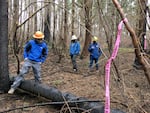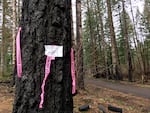A bill that aims to change how Oregon manages its forests, and create more oversight, had a public hearing in the state Legislature on Wednesday.
Senate Bill 335 would make three significant changes to the state Board of Forestry. Those changes include reducing how many members can gain income from the timber industry, dissolve the Regional Forest Practices Advisory Committees, and allow the governor to appoint the state forester rather than the board.

A proposal before the Oregon Legislature would make significant changes to the state Board of Forestry, an agency that influences forest management policy.
Kristyna Wentz-Graff / OPB
The bill was introduced by State Sen. Jeff Golden, D-Ashland, and heard by the Senate Committee of Natural Resources and Wildfire Recovery. It comes following extensive investigative reporting by OPB, the Oregonian/OregonLive and ProPublica that outlined numerous ties between the timber industry and Oregon regulators.
Currently, the Board of Forestry is a seven-member committee appointed by the governor, whose mission is to implement sustainable forest management policies and programs for public and private forests. The board supervises all matters of forest policy, as well as adopts regulations for forest practices.
The proposed changes in the bill would lower the number of members allowed to gain significant income from forest operations or timber products from three members to two.
One seat would be unrestricted in the amount of income and the second would be provided for an owner of woodlands of 5,000 acres or less.
Currently, the law states “no more than three members of the board may derive any significant portion of their income from persons or organizations that are subject to regulation.”
Golden said the intention of the bill is grounded on one core principle: to reduce any conflict of interests within the Board of Forestry members and the timber industry.
“The governance of our regulatory agencies should be free from pronounced influence by the industries they regulate,” he said at Wednesday’s hearing.
Golden said removing the outside financial interests was a matter of promoting good governance.
“When three of the seven seats governing a regulatory agency are filled by employers of shareholders of the regulated industry, that standard is not met,” he said. “Especially when thousands of the knowledgeable and qualified Oregonians are available to serve who do not work for that regulated industry.”
The second part of the bill’s amendments would set a deadline of 2022 to dissolve the Regional Forest Practices Advisory Committees, a trio of committees serving the Northwest, Southwest, and Eastern regions of the state. The committees were created in 1971 under the Oregon Forest Practices Act.
It would also require the Board of Forestry to create workgroups to research, assess, or provide recommendations on issues and questions related to statutory forest policies. This, the bill states, would allow the board more flexibility and a wider set of input on policies.
Right now, at least two-thirds of the advisors are private landowners, private timber owners or authorized representatives of such landowners who regularly engage in timber operations.
The bill also would give the governor the power to hire or discharge the state forester from the board.
Several people submitted testimonies either for or against the bill. Many in the timber industry were concerned that limiting the amount of seats for members and experts in the timber industry would have a negative impact.
Cindy Robert, a spokesperson for Hancock Forest Management, said reducing the number of members from the timber industry could cause communication problems between the board and foresters. She said the Forestry Board should have enough experienced and trained people that understand the industry.
“The pendulum swings. Sometimes, we say, ‘We don’t need those.’ Four years from now, we’re going to say, ‘We need somebody to communicate these things,’” Robert said. “Instead of just getting rid of them, let’s fix them. Let’s change them and have a different make-up.”
In terms of giving the governor more power over the state forester, current board member Jim Kelly said the current system in place is not working.
“The board is a bunch of part-time volunteers. We’re unpaid. We’re not there every day,” Kelly said. “We lack knowledge of the state forester’s day-to-day performance, and we are not intimately knowledgeable about the HR policies of the state.”
He agreed the governor should take responsibility, ensuring the department has a leader that can confidently head the department while the Board of Forestry focuses on policy.
Golden said introducing a bill with three significant changes at once is challenging. He is currently looking at different options and is considering introducing separate bills to improve support for the changes.





















